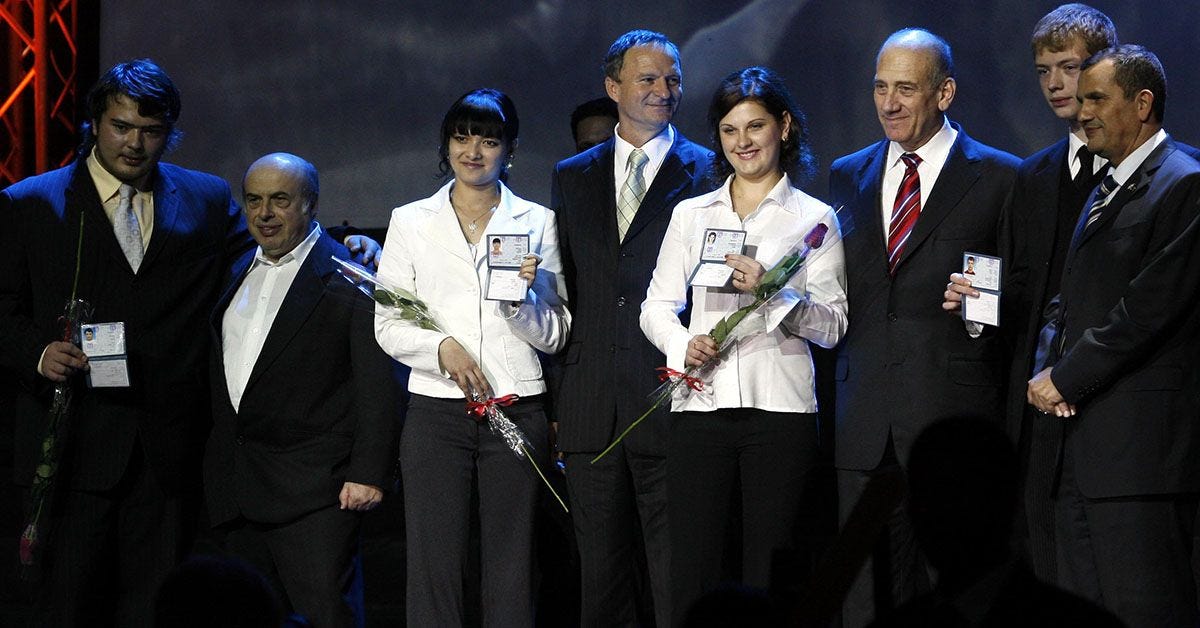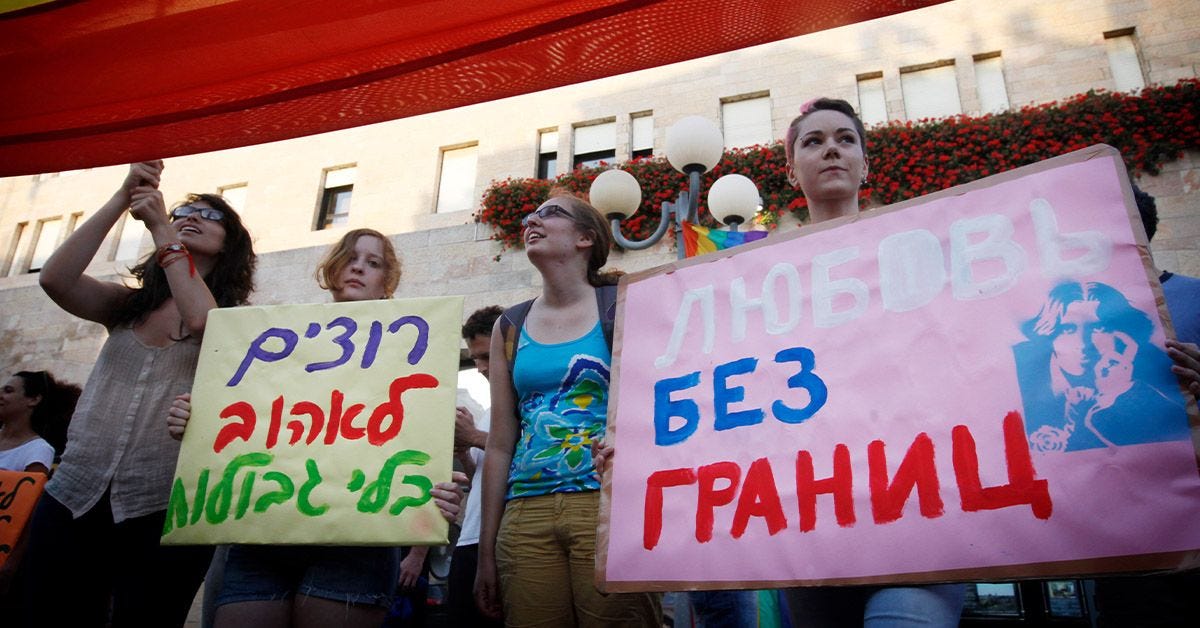Russia v. Jewish Agency: Behind Putin's Curtain
Ksenia Svetlova, a Soviet immigrant who became an Israeli MK, delves into the backstory of Putin's threats to expel the Jewish Agency from Russia

Just four days into the premiership of Yair Lapid, on July 5, there were whiffs of a major diplomatic crisis between Russia and Israel in the air. The employees of the Jewish Agency in Russia had received an official “warning” from the Ministry of Justice alleging that its operations violated Russian law and may be shut down.
The Jewish Agency – or “Sochnut” in Hebrew – has been very active throughout Russia (and the former Soviet Union) since the late 1980s. Allowing the Agency to operate openly was a seismic development. Where Jews had been sentenced to harsh prison sentences just years earlier for the crime of practicing their religion or requesting a visa to emigrate, they were now free to openly “be,” and were, furthermore, assisted by a foreign-based agency.
In the final years of the USSR, the Agency’s primary role was to assist Jews wishing to emigrate to Israel and, equally importantly, participating in the rebuilding of Jewish life in the country. The damage wreaked upon the population of approximately three million Jews in Russia, Ukraine and other former Soviet republics resulting from extreme and unceasing persecution and repression was enormous.
The immediate post-Soviet era allowed a Jewish renaissance to flourish in the Russian Federation. Jewish religious and lay leaders felt secure and took great pride in the vibrant community they had revived after decades of fear, and the extremely punitive state-sponsored antisemitism of the Soviet era.

On July 5, 2022, everything changed.
But the reality is that what seemed to happen so suddenly had been building for many years, reflected in the steadfast focus of domestic security services on the Jewish Agency.
I. THE JULY 5 CRISIS: MOSCOW THREATENS TO CLOSE THE JEWISH AGENCY IN RUSSIA
Upon hearing the news of a threatened closure, Agency representatives in Israel and Russia attempted a calming spin, saying that the story was blown out of proportion; that the issue was procedural, not political or diplomatic. It would pass.
On July 19, Russian President Vladimir Putin returned to Moscow from a tripartite summit in Tehran which also included Turkey. That same day, the Agency was notified that a court hearing would be held – on July 28 – at which the Ministry of Justice would demand that the Agency cease operations in Russia.
Israel immediately attempted to send a delegation of legal experts to negotiate with Russia and defuse the situation before it became a full-blown crisis.
Forebodingly, Moscow denied the Israeli officials entry visas until 36 hours before the commencement of the trial. In Jerusalem this development was seen as a clear signal of Russia’s intention to escalate the conflict.
The common, critical and central element of domestic Russian Jewish organizations was that they were invested – fully – in the continuation and flourishing of Jewish life in the country. The Jewish Agency, however, had a mandate to assist and counsel any Jewish Russians wishing to emigrate to Israel. It was always in a special, suspect category.
The “official” reason provided for this drastic action was an allegation that the Jewish Agency had breached Russian law by collecting and maintaining a database with sensitive information about Russian citizens. This represented a breach of the privacy rights of Russian citizens by a foreign agent.
The Russians were clearly turning up the heat.
II. THE PROFOUND IMPACT OF THE “SOCHNUT” ON JEWISH LIFE IN RUSSIA
As Russia sprinted from a command economy to a market one in a flash, the resulting social and economic upheaval was severe and intense. Into this breach stepped numerous enterprising Jewish organizations and individuals. All were focused on reviving Jewish life that had, for more than 70 years, been dormant, unless “underground.”
The common, critical and central element of domestic Russian Jewish organizations was that they were invested – fully – in the continuation and flourishing of Jewish life in the country. The Jewish Agency, however, had a mandate to assist and counsel any Jewish Russians wishing to emigrate to Israel. It was always in a special, suspect category.

A little known fact is that in 1996, Russian authorities threatened to close the Jewish Agency, alleging that it was engaged in illegal activity, acting as a “foreign agent.”
We know now that the fuss then had nothing to do with Agency activity and everything to do with a valuable patch of property in Jerusalem that Moscow claimed as its own. The matter was resolved eight years later to Russia’s satisfaction, but the warning shot certainly grabbed Israel’s attention.
III. THE QUIET UNEASE OF 1996-2022
Vladislav Roytblat, who was a representative of The Joint Distribution Center in the Russian Federation from 2014-2019, recalled the uncertainty of this time in a recent conversation with State of Tel Aviv. He is certain that the Jewish Agency was singled out for “special treatment,” unlike the Joint and other foreign Jewish organizations that operated in Russia at the time.
Roytblat recalled a number of unusual occurrences during his tenure in Russia. Once, for example, a Jewish Agency representative in Omsk, Siberia was questioned by several representatives from the FSB. They were asking about why a formerly high-ranking IDF official was serving with the Agency in Russia in a senior role.
Roytblat felt that the Jewish Agency in the Russian Federation was being harassed systematically. There were many incidents – like the one in Omsk – often involving educational camps. Sudden, inexplicable problems arose – often last-minute – with procuring rental accommodations suitable for their events, for example. It was clear that the FSB was watching Agency activities carefully and they wanted everyone to know.
Until recently, most Russian Jews and Jewish organizations did not experience overt problems or pressure. Many believed that the special connection between President Putin and the Jews, based on his childhood and youth experiences and memories, would protect them.
Whereas the Jewish Agency was an ongoing concern for the FSB, if other Jewish organizations were perceived to be “too active” in promoting immigration or educational programs in Israel, they encountered similar challenges.
Alexander Shlimak, director of the Moscow branch of Hillel from 2009-2015, recalls a day when FSB officers stopped by his office. They knew every single detail about Hillel’s operations, he said, which was very disconcerting.
“We were preparing a major Hillel event at that time, and they demanded that we present them with a list of participants’ names. Their ostensible reason for this intrusive request was “security,” but Shlimak did not believe that. “They already knew everything about it,” he explained when speaking with State of Tel Aviv.
They just wanted the Jews to know that they were being surveilled. Perhaps, even when the state seemed to be relaxed about the Russian Jewish renaissance, they really were not.
IV. THE PUTIN FACTOR: A HELP OR THE PROBLEM?
Just as in the Soviet days, the state security services continued to keep an eye on the activity of Jewish religious and community organizations, especially those with strong ties to the State of Israel. And it seems that the time has now come for this trove of information to be deployed, once again, against the Jewish Agency, Israel and, possibly, Russian Jews.
In spite of the close scrutiny, until recently, most Russian Jews and Jewish organizations did not experience overt problems or pressure. Many believed that the special connection between President Putin and the Jews, based on his childhood and youth experiences and memories, would protect them.
Over time, Putin’s regime has become significantly more authoritarian and repressive. Particularly since the massive and frequent protests at Moscow’s Bolotnaya Square between 2011-2013, the authorities have been especially harsh with civil society organizations, with particular wrath targeting human rights groups.

Some organizations were forced to close, some were prosecuted on various fabricated charges, and some were designated as foreign agents. With the annexation of Crimea and hostilities with Ukraine in 2014, the crackdown on civil society intensified. Even the most tenacious groups were forced to submit to the creeping authoritarianism; realizing that the court system just rubber-stamped predetermined outcomes.
Eventually, the state turned its sights to the Jewish Agency. Beginning in 2019, the pressure began to build, yet again.
One thing is very clear. Russian Jews – not only the Jewish Agency – have been put on notice.
Semyon Dovzhik, a former Sochnut press secretary in the Russian language, recalls the sudden chill that set in. “There were always some routine checkups,” he said, “but three years ago (2019) the situation changed dramatically. Suddenly there were serious inspections – all documents were checked thoroughly, and sometimes they were confiscated.”
Dovzhik likened the atmosphere and relationship to one of hyper-alertness, with the Agency fearing and understanding that “something might happen at any time... but the only thing that changed was the attitude,” Dovzhik explains. Jewish Agency operations carried on as usual, for the time being.
The current Jewish Agency crisis erupted at a time when relations between Russia and Israel were souring. The pretext for the 2022 attack on the Jewish Agency is that Russia is owed property rights in yet another lucrative Jerusalem property, that the state claims belongs to the Russian Orthodox church.
But that’s just the latest grievance. Russian authorities have been diligently compiling a dossier of alleged Israeli transgressions, including Moscow’s displeasure with certain actions said to have been undertaken by Israel in Syria.
And then, of course, there’s the quite significant issue of Ukraine, as well as the extreme military tension between Israel and Russia over ongoing activity in Syria. (Both issues are considered at length in this superb analysis by Moav Vardi.)
Putin is clearly displeased with Israel and sending very clear signals about what has irked him.
V. WHERE TO FROM HERE
This is a raw power play.
On Friday, August 19, Moscow’s Basmannaya Court deferred its threat to issue a verdict in the case of Russia v. Jewish Agency for another month.
The Court denied the Jewish Agency’s request for an additional two months to gather exculpatory evidence, particularly in light of the extreme consequences and very truncated time for case preparation. In the meantime, in an effort to address the alleged problems regarding its operations, the Agency has agreed to modify certain procedures that would address concerns put forward by the Russian Ministry of Justice.
The judge agreed to a 30-day adjournment of proceedings. It seems that any additional evidence the Agency intends to submit must be presented by September 19. It is also possible that a verdict could be rendered the same day.
Jewish Agency employees in Russia concede that they are “not optimistic” about the eventual outcome of the court case. But they do express hope that during this time some form of rapprochement will be negotiated between Russia and Israel to allow Agency operations to continue.
One thing is very clear. Russian Jews – not only the Jewish Agency – have been put on notice.
After centuries of extreme persecution in Tzarist Russia, and decades under Soviet rule, Russian Jews were beginning to feel “at home” in the “new” Russia. Unlike the Soviet authorities, the new rulers of Russia did not engage in state-sponsored antisemitism, and practicing Judaism or learning Hebrew was not an act of subversion meriting serious gulag or prison time. Quite the opposite – Jewish life was thriving. So much so that Russian Jews were becoming a little too comfortable, in the eyes of some, while the witch-hunt against civil society, the NGO’s and foreign institutions was in full swing.
Many Jewish leaders and organizations maintained a silence with respect to these changes, likely from an ingrained sense of caution.

But that, too, is changing.
Pinchas Goldschmidt, the Chief Rabbi of Moscow since the early 90s, abruptly left Russia in March 2022. In June, when he officially stepped down from his position, his daughter-in-law – journalist Avital Chizhik-Goldschmidt – disclosed publicly that her father-in-law had been pressured by Russian authorities to support its war against Ukraine. He refused to do so.
Can finally share that my in-laws, Moscow Chief Rabbi @PinchasRabbi & Rebbetzin Dara Goldschmidt, have been put under pressure by authorities to publicly support the 'special operation' in Ukraine — and refused. pic.twitter.com/Gy7zgI3YkJ
— Avital Chizhik-Goldschmidt (@avitalrachel) June 7, 2022
Speaking to the press recently, Rabbi Goldschmidt described the current situation in Russia darkly, indicating that it was “not the same country” he had moved to 29 years ago.
When the Jewish Agency story broke in early July, Rabbi Goldschmidt issued a chilling statement saying: “What the Jewish Agency didn’t succeed in doing in terms of encouraging the Jewish community to immigrate, the Russian government has [accomplished], with its policies over the past few months with the fighting in Ukraine.”
Many friends in Moscow with whom I have spoken in recent weeks expressed grave concern about the possible closure of the Jewish Agency. Such an event would be dramatic, not just because of its support of potential immigrants, but even more so, because its mere presence has become a powerful symbol of a time when Jews believed they were free and equal in Russia; free to participate fully in life there and at liberty to leave, should they so choose.
Many now fear that the Iron Curtain may well close, once again, and that Russian Jews will be the first victims. For them it is clear that Russia has very deliberately chosen isolation – first from the West – and now also from Israel. The Jewish Agency episode may well be a precursor of things to come.
The potential closure of the Jewish Agency raises fears of reverting to the Soviet era of paranoia and constant suspicion, an obsessive state-sponsored hunt for inner and outer enemies. Should the Jewish Agency become persona non grata in Russia, its Jews may well be forced to reassume their well-rehearsed role as the ultimate “other,” scheming with their “foreign connections” and “foreign influence.”
Just like it used to be during the Soviet era.
This article is available to read for paid subscribers only. Thank you for being a member of the State of Tel Aviv community.

